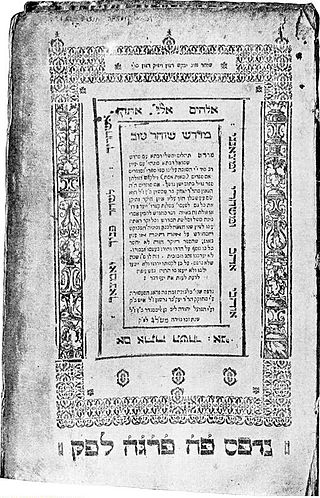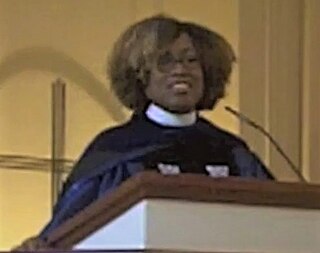Interpretation of the Christian Bible
African American biblical hermeneutics or African American biblical interpretation is the study of the interpretation of the Christian Bible, informed by African American history and experiences.
| Part of a series on the |
| History of Christian theology |
|---|
 |
| |
African American biblical hermeneutics or African American biblical interpretation is the study of the interpretation of the Christian Bible, informed by African American history and experiences.
Vincent L. Wimbush traces the history of African American biblical hermeneutics to the earliest encounters African Americans had with the Bible as a consequence of their forced enslavement and exportation from the African soil to the Americas, and the direct and indirect activities of Europeans to convert Africans. Hence, the Bible was perceived as the Book for Europeans to interpret, which in turn gave justification for European Christian domination. [1] However, as African Americans began to claim Christianity as their own, African American biblical hermeneutics arose out of the experiences of racism in the United States. The discourse has been dominated by two core paradigmatic events in the Bible, the Exodus from Egypt and the ministry of Jesus, both used to articulate God's concern for those under social and political bondage. For biblical scholars like Wimbush, Charles Copher, and Cain Hope Felder, they have advocated for a suspicion of Euro-American readings of the Bible which promote a pervasive Eurocentrism. [2]
Since the 1988 publication of Renita J. Weems's Just a Sister Away, there has been a growing interest in a womanist approach to reading the Bible. While some have seen this as a derivative of feminist biblical hermeneutics, Nyasha Junior argues that it has "multiple sources, including U.S. women's activism, womanist scholarship in religion-related fields, and feminist biblical scholarship." [3]
Others, such as Esau McCaulley, have argued that the discourse around African American biblical interpretation has been dominated by Black liberation theology between the 1920s to the 1960s. As such, this trajectory tends to overemphasize political liberation as the main concern of the Bible, while overlooking conversionistic and holiness strands that can be found in the pulpits. Hence, McCaulley advocates for a recovery of what he calls "Black ecclesial interpretation." [4]

Midrash is expansive Jewish Biblical exegesis using a rabbinic mode of interpretation prominent in the Talmud. The word itself means "textual interpretation", "study", or "exegesis", derived from the root verb darash (דָּרַשׁ), which means "resort to, seek, seek with care, enquire, require", forms of which appear frequently in the Hebrew Bible.

Womanism is a term originating from the work of African American author Alice Walker in her 1983 book In Search of Our Mother's Garden: Womanist Prose, denoting a movement within feminism, primarily championed by Black feminists. Walker coined the term "womanist" in the short story Coming Apart in 1979. Her initial use of the term evolved to envelop a spectrum of issues and perspectives facing black women and others.
Biblical hermeneutics is the study of the principles of interpretation concerning the books of the Bible. It is part of the broader field of hermeneutics, which involves the study of principles of interpretation, both theory and methodology, for all forms of communication, nonverbal and verbal.
Womanist theology is a methodological approach to theology which centers the experience and perspectives of Black women, particularly African-American women. The first generation of womanist theologians and ethicists began writing in the mid to late 1980s, and the field has since expanded significantly. The term has its roots in Alice Walker's writings on womanism. "Womanist theology" was first used in an article in 1987 by Delores S. Williams. Within Christian theological discourse, Womanist theology emerged as a corrective to early feminist theology written by white feminists that did not address the impact of race on women's lives, or take into account the realities faced by Black women within the United States. Similarly, womanist theologians highlighted the ways in which Black theology, written predominantly by male theologians, failed to consider the perspectives and insights of Black women. Scholars who espouse womanist theology are not monolithic nor do they adopt each aspect of Walker's definition. Yet, these scholars often find kinship in their anti-sexist, antiracist and anti-classist commitments to feminist and liberation theologies.
Biblical literalism or biblicism is a term used differently by different authors concerning biblical interpretation. It can equate to the dictionary definition of literalism: "adherence to the exact letter or the literal sense", where literal means "in accordance with, involving, or being the primary or strict meaning of the word or words; not figurative or metaphorical".

Katie Geneva Cannon was an American Christian theologian and ethicist associated with womanist theology and black theology. In 1974 she became the first African-American woman ordained in the United Presbyterian Church (USA).
Daniel Patte is a French-American biblical scholar and author. Patte is, since 2013, Professor Emeritus of Religious Studies, New Testament and Christianity at Vanderbilt University where he taught from 1971. He studied in both European and American schools: following his Baccalauréat in Philosophy he received a Baccalauréat en Théologie (1960) from the Faculté de Théologie Protestante, Montpellier, France, where he met his wife, Aline Teitelbaum; Licence en Théologie, from the University of Geneva, Switzerland, and a Th.D. (1971) from the Jewish Christian Center at Chicago Theological Seminary. As a biblical scholar and teacher in various settings around the world, Patte calls for an ethics of biblical interpretation that involves acknowledging the contextual character of any interpretation of the Bible, as his numerous books and articles indicate. In the 1970s-1980s Patte pioneered structural criticism in biblical studies, then served two terms (1992–98) as the General Editor of Semeia, an Experimental Journal for Biblical Criticism of the Society of Biblical Literature. Patte initiated and chaired programs of the Society of Biblical Literature, including on Semiotic and Exegesis, Romans Through History and Cultures, and, since 2007, Contextual Biblical Interpretation. With colleagues of the Society of Biblical Literature and of the American Academy of Religion involved in these programs, he envisioned and edited A Global Bible Commentary (2004) and The Cambridge Dictionary of Christianity (2010).
Phyllis Trible is a feminist biblical scholar from Richmond, Virginia, United States. Trible's scholarship focuses on the Hebrew Bible and she is noted for her prominent influence on feminist biblical interpretation. Trible has written a multitude of books on interpretation of the Hebrew Bible, and has lectured around the world, including the United States, New Zealand, Australia, Japan, Canada, and a number of countries in Europe.

Sheffield Phoenix Press Ltd. (SPP) is an independent academic publisher specializing in biblical studies. It was launched in January 2004, continuing the traditions of the former Sheffield Academic Press.

Delores Seneva Williams was an American Presbyterian theologian and professor notable for her formative role in the development of womanist theology and best known for her book Sisters in the Wilderness: The Challenge of Womanist God-Talk. Her writings use black women's experiences as epistemological sources, and she is known for her womanist critique of atonement theories. As opposed to feminist theology, predominantly practiced by white women, and black theology, predominantly practiced by black men, Williams argued that black women's experiences generate critical theological insights and questions.
Political theology in sub-Saharan Africa deals with the relationship of theology and politics born from and/or specific to the circumstances of the region. Arising from the anti-apartheid struggle in South Africa and nationalist campaigns of the mid- to late twentieth century elsewhere, the increasing numbers of Christians in sub-Saharan Africa has led to an increased interest in Christian responses to the region's continuing issues of poverty, violence, and war. According to the Cameroonian theologian and sociologist Jean-Marc Éla, African Christianity "has to be formulated from the struggles of our people, from their joys, from their pains, from their hopes and from their frustrations today." African theology is heavily influenced by liberation theology, global black theology, and postcolonial theology.
Postcolonial theology is the application of postcolonial criticism to Christian theology. As is in postcolonial discourse, the term postcolonial is used without a hyphen, denoting an intellectual reaction against the colonial, instead of being merely sequential to it.
Renita J. Weems is an American Protestant biblical scholar, theologian, author and ordained minister. She is the first black woman to earn a Ph.D. in Old Testament studies in the United States. She was influenced by the movement in the last half of the 20th century which argues that context matters and shapes our scholarship and understanding of truth. She is best known for her contribution to womanist theology, feminist studies in religion and black religious thought. She is recognized as one of the first scholars to bring black women's ways of reading and interpreting the Bible into mainstream academic discourse. In 1989 she received a Ph.D. in Old Testament/Hebrew Bible studies from Princeton Theological Seminary making her the first African American woman to earn a Ph.D. in the field. Her work in womanist biblical interpretation is frequently cited in feminist theology and womanist theology.
Vincent Lee Wimbush is an American New Testament scholar, known for his work in African American biblical hermeneutics.
Mitzi J. Smith is an American biblical scholar who is J. Davison Philips Professor of New Testament at Columbia Theological Seminary. She is the first African-American woman to earn a PhD in New Testament from Harvard. She has written extensively in the field of womanist biblical hermeneutics, particularly on the intersection between race, gender, class, and biblical studies. She considers her work a form of social justice activism that brings attention to unequal treatment of marginalized groups.
Nyasha Junior is an American biblical scholar. Her research focuses on the connections between religion, race, and gender within the Hebrew Bible. She holds a PhD from Princeton Theological Seminary. She was associate professor at Temple University before moving to the University of Toronto in the department for the Study of Religion. She was a visiting associate professor and research associate at Harvard Divinity School for the 2020–21 academic year.
Asian American biblical hermeneutics or Asian American biblical interpretation is the study of the interpretation of the Christian Bible, informed by Asian American history and experiences.
Esau McCaulley is an American biblical scholar and assistant professor of New Testament at Wheaton College, Illinois, canon theologian for the Anglican Diocese of Churches for the Sake of Others, as well as a theologian-in-residence at Progressive Baptist Church, a historically black congregation in Chicago.

Wilda C. Gafney, also known as Wil Gafney, is an American biblical scholar and Episcopal priest who is the Right Rev. Sam B. Hulsey Professor of Hebrew Bible at Brite Divinity School of Texas Christian University in Fort Worth, Texas. She is specialist in womanist biblical interpretation, and topics including gender and race.
Sarojini Nadar is a South African theologian and biblical scholar who is the Desmond Tutu Research Chair in Religion and Social Justice at the University of the Western Cape.